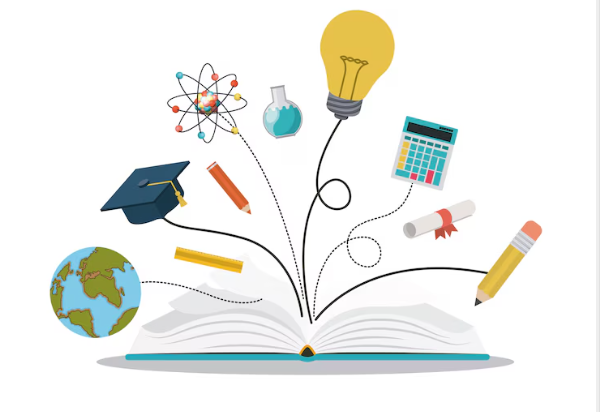BLOG
4 Pillars of Holistic Education Every Parent Should Know About

Holistic education focuses on ‘all-round’ development in the growth and development of the child based on four pillars, including emotional, cognitive, social, and physical. It helps in the development of a child’s emotional intelligence, intellectual capabilities, social interactions, and physical fitness so that the growth may be all-rounded. By combining these aspects, holistic education prepares children for life’s challenges and helps them flourish academically, socially, and personally.
What is holistic education?
The philosophy of holistic education is to develop the child by addressing the intellectual, emotional, social, physical, and spiritual areas. Therefore, it is concerned with all the dimensions of a child’s growth. This helps in nurturing each of the aspects for the purpose of well-rounded development. It integrates academic learning with personal growth in order to promote balance in life and prepare children for a successful and fulfilling life.
Components of holistic education
The components of holistic education are:
- Cultural development
Cultural development is necessary to understand one’s own culture and also to respect diverse cultures. This helps in learning and valuing different perspectives and differences. Children also learn empathy and tolerance and can positively connect with others. This broadens their thinking abilities, gives them an open mind and helps them develop a sense of belongingness.
- Moral development
Moral development is vital in holistic education as it imparts values that shape ethical behavior and aid in decision-making. Principles such as honesty and respect guide children in knowing how to act when faced with difficult situations. This acts as a moral compass for making correct ethical decisions, building positive relationships, and contributing to a just and caring community.
- Emotional development
It is believed that emotional development in a child is the foundation of his or her general development because it gives birth to emotional intelligence and self-awareness. Children develop resilience and develop social skills better by knowing and managing their emotions and those of others. Such skills enable them to be better equipped when they face challenges. It also helps in maintaining good and healthy relations and brings success eventually on both the personal and academic fronts.
- Intellectual development
Intellectual development emphasizes the importance of critical thinking, creativity, and problem-solving within a child’s realm of development. Critical thinking can help children make their way through an appropriate analysis and evaluation of information. Creativity helps to promote new ideas in children by thinking outside the box. Problem-solving skills can help children rise to different challenges confidently, thus easily adapting and learning throughout the lifespan in an ever-changing world.
The 4 pillars of holistic education
- Learning to know
The “Learning to Know” pillar is all about developing knowledge and the ability to understand basic concepts and ideas on which lifelong learning will depend. It emphasizes cognitive competencies and other skills such as critical thinking, reasoning, and problem-solving. Hence facilitating the acquisition of core knowledge while fostering intellectual curiosity. It allows us to explore a wide range of subject matter, make links between different areas of learning, and accommodate change or new information, which is imperative for continuous creation in an increasingly complicated world.
- Learning to do
This refers to applying all the learned theoretical knowledge to real-life situations. It equips students with the practical skills that come in handy during difficulties. It stresses vocational and technical skills that improve work efficiency and enhance overall performance. Apart from traditional skills, it emphasizes interpersonal skills such as communication, leadership, adaptability, etc. that are necessary in building healthy bonds and personal well-being.
- Learning to live together
This fosters belongingness and fraternity. Promotion of teamwork, responsibility, empathy and cooperation contributes to a strong and harmonious community. Students learn to live without any discrimination or stereotypes. This pillar teaches to coexist and creates an inclusive world.
- Learning to be
“Learning to be” focuses on self-awareness, personal growth, and autonomy, which form the very backbone of development. The more a child learns about himself and what he values, the more confident and independent he becomes. Self-awareness leads to growth, and autonomy enables one to make informed decisions, which are necessary for a well-rounded and meaningful life.
Holistic Education Methods
- Education models
In India, there are various educational models that support holistic education:
- Montessori: This method focuses on hands-on learning that combines playing, learning and exploring new things on your own.
- Waldorf: they follow the 3H principle, i.e., head, heart and hands involvement in the learning method.
- ICSE: This includes personal and intellectual advancement.
- CBSE: This curriculum strikes a balance between academic skills and moral values.
- Teacher strategies
Teachers play an important role in holistic education. They provide a supportive and conducive environment for the personal growth and development of students. Providing customized teaching based on the analysis of strengths and weaknesses of students to boost self-confidence. They also encourage students to consider self-reflection and practice mindfulness. All these strategies lead to the holistic development of a child.
- Offering praise and recognition
Praise and recognition become positive reinforcement for the initiation of overall growth and development. The acknowledged accomplishments and efforts of students increase self-esteem, motivation and higher self-confidence. Through this reinforcement, growth mindset needed for life-long learning, emotional resilience, and social engagement is cultivated, contributing to holistic development.
Top Examples of Holistic Education in Teaching & Learning
This includes:
- Project-based learning: enhances critical thinking and teamwork.
- Integrated thematic integration: linking diverse subjects.
- Experiential learning: gives hands-on experience
- Service learning: develops traits like empathy and responsibility
- Holistic assessment: focuses on holistic development of students
- Mindfulness and wellness programs: facilitate self-reflection and facilitate self-awareness.
Benefits of holistic education
The advantages of holistic education are:
- Improves critical-thinking and problem-solving skills.
- Promotes introspection and builds self-confidence.
- Encourages creativity.
- Gives an option to explore new things.
- Self-directed learning.
- Essential skills like responsibility, empathy, collaboration, etc. are imparted.
Conclusion
This advanced method of education has seen a profound impact on the overall performance of the students. Looking at its advantages in producing well-rounded children, parents should definitely give it a thought to join their children in schools that emphasize holistic education.
The four pillars of holistic education lay the foundation for comprehensive student development. Integrated with moral education practices and life skills training, students evolve academically and personally. This approach enhances emotional intelligence and real-world readiness. Institutions that adopt this philosophy are among the most respected top cbse schools in bangalore. New Horizon Gurukul is also proud to be one of the leading gurukul schools in bangalore.
Frequently Asked Questions (FAQs)
1. What are the main components of holistic education?
Cultural development, emotional development, intellectual development and moral development are the four major components of holistic education.
2. How does holistic education differ from traditional educational methods?
Holistic education focuses on developing the emotional, social, and ethical competence of a student, besides developing creativity and critical thinking. Traditional education mainly focuses on rote learning, academic achievement, and standardized testing; it places more emphasis on intellectual development compared to other aspects of personal development.
3. Why are moral values important in holistic education?
Moral values are essential in holistic education for developing the character of a student through which he is guided to make ethical decisions and develops the feeling of empathy, respect, and social responsibility. Through holistic education, a well-rounded personality can be developed that helps in achieving academic and professional success.
4. How can parents support holistic education at home?
Parents can promote holistic education in the home through several ways, such as encouraging open communication, curiosity, and empathy. They can also expose them to various learning experiences, engage children in decision-making activities, model appropriate behavior, and establish an environment that has balance on emotional well-being, creativity, social skills, and academics.




